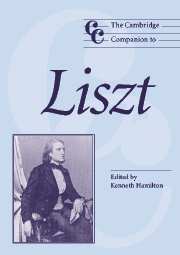Book contents
- Frontmatter
- 1 Liszt: the Romantic artist
- 2 Inventing Liszt's life: early biography and autobiography
- 3 Liszt and the twentieth century
- 4 Liszt's early and Weimar piano works
- 5 Liszt's late piano works: a survey
- 6 Liszt's late piano works: larger forms
- 7 Liszt's piano concerti: a lost tradition
- 8 Performing Liszt's piano music
- 9 Liszt's Lieder
- 10 Liszt's symphonic poems and symphonies
- 11 Liszt's sacred choral music
- Notes
- Select bibliography
- Index of Liszt’s musical works
- General index
5 - Liszt's late piano works: a survey
Published online by Cambridge University Press: 28 September 2011
- Frontmatter
- 1 Liszt: the Romantic artist
- 2 Inventing Liszt's life: early biography and autobiography
- 3 Liszt and the twentieth century
- 4 Liszt's early and Weimar piano works
- 5 Liszt's late piano works: a survey
- 6 Liszt's late piano works: larger forms
- 7 Liszt's piano concerti: a lost tradition
- 8 Performing Liszt's piano music
- 9 Liszt's Lieder
- 10 Liszt's symphonic poems and symphonies
- 11 Liszt's sacred choral music
- Notes
- Select bibliography
- Index of Liszt’s musical works
- General index
Summary
I have been ensconced in the small tower of the Villa d’Este since the evening before last … It is more than comfortable: above all during the winter, when the invasion of civilized-barbarians makes my staying in Rome insufferable. Here I find myself again at my best; my apartment is very nicely arranged: two fireplaces, a new lamp hung from the ceiling of a little parlor which acts as a boudoir, – books and music in abundance, – in addition, the magnificent terrace with the dome of St. Peter’s at the edge of the horizon, and the venerable cypress-patriarchs you know so well.
…To fulfill my duties as a Christian, and to spend my time suitably by continuing to write my notes, is my whole life: nothing else concerns me in the slightest.
When he took up his new quarters in the Villa d'Este in 1869, Franz Liszt was 58 years old, and he seemed to recognise that a new phase of his life was beginning. The Villa afforded the seclusion he needed to escape the demands of a hectic schedule and to turn his attention to what he most wanted to do – write music. Nonetheless, he was not able or willing to renounce the obligations he felt toward his public, his Hungarian homeland, his Roman Catholic faith, and especially the significant group of young musicians who sought his guidance. He had hit upon the arrangement of a ‘vie trifurquée’ that he was to maintain for the remainder of his years, dividing his time between Rome, Weimar, and Budapest.
- Type
- Chapter
- Information
- The Cambridge Companion to Liszt , pp. 86 - 119Publisher: Cambridge University PressPrint publication year: 2005
- 1
- Cited by

